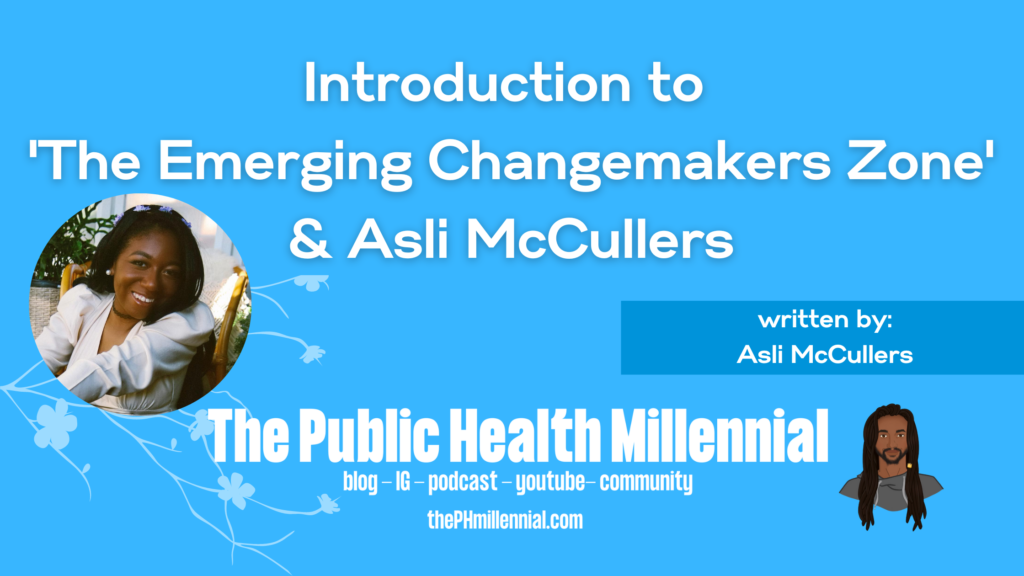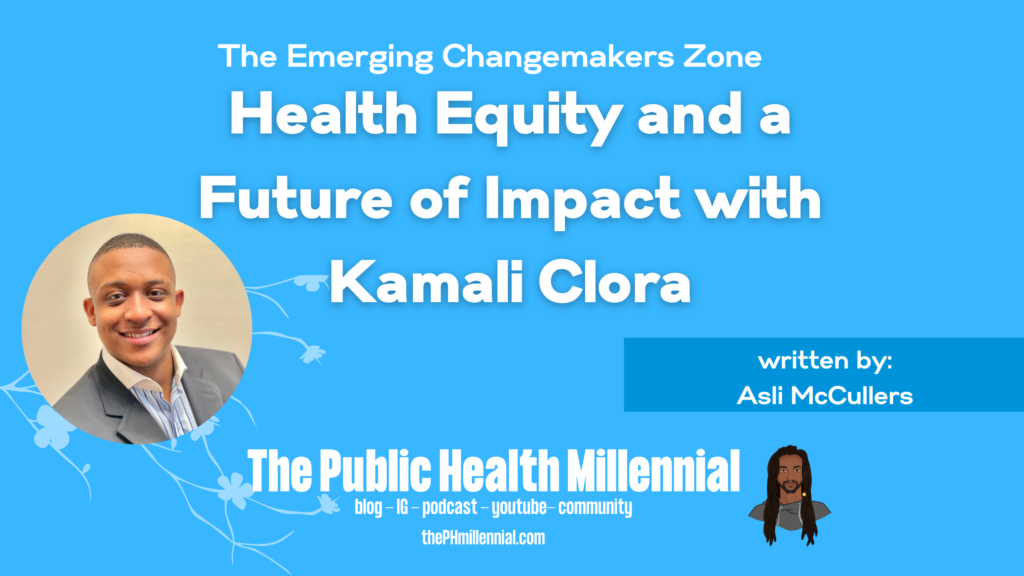What “fuels your fire” for health equity? Malek Mitchell is a first year medical student at University of North Carolina Chapel Hill, and recently completed his Master of Public Health (MPH) in Health Behavior at Brown University. He previously earned his Bachelor’s degree in Biology with minors in chemistry and psychology at North Carolina Agricultural and Technical State University (NC A&T). In this conversation, we discuss the steps that aligned Malek into a career in medicine with a health equity focus and how his identity and upbringing as a Black man from the south shapes his passions in research and in practice.
”Deep Roots”: More on Malek’s Community-Based Inspiration for Pursuing Medicine
As a freshman at NC A&T, Malek, who was majoring in Biology, knew for sure that he was going to forge a career in Medicine. This roots back to some experiences he has with his family in rural North Carolina, which gives him a grounding in his journey beyond “money” or any superficial motivations–for Malek, it’s all about connecting back to his loved ones. He shared;
“Medicine is something I wanted to do for a super, super long time. Years ago, the day before my birthday, my mom went to go check on my grandmother…she found my grandmother having a stroke. My grandmother lived with my aunt and my uncle, but they didn’t know how to recognize the signs of a stroke. Unfortunately, the stroke caused brain damage, and my grandmother eventually passed away.
As I got older and I reflected on that situation, I started asking questions like; ‘Why didn’t my aunt and uncle know the signs of a stroke? Why didn’t my grandmother have good access to preventive medicine? What could have been done to prevent this? What type of health education was going on in the community?’ At that time I didn’t really know, different social determinants that impacted what happened to my grandmother at that time…I didn’t know those things were called social determinants of health. So, my grandmother’s death really motivated me to get into medicine. I wanted to be a physician that was very community facing and interactive with the community.”
From this gripping experience, Malek stressed that bringing health knowledge back to his home community in Raeford, North Carolina is a critical motivation for pursuing medicine. One story related to medical mistrust, which is an ongoing challenge for many southern Black communities due to historical mistreatment.
“I feel like anytime I go back home, I’m seeing medical mistrust. That’s something that I feel like I’ve witnessed a lot as a Black man growing up in the South. Last time I went back home, I went to the barber shop with my dad, and at the barbershop that day, people started talking about different health conditions. My dad was recently diagnosed with Type II diabetes, and he takes Metformin. This guy in the barber shop started saying, “…man, don’t take that Metformin! it’s messing up your liver, your kidneys!” and I’m just like, what is he talking about? I’m just wondering where he got that from, who told him that. And I’m over here thinking to myself, I know my dad better not stop taking his Metformin, lol!
There’s a lot of cases where some of the other people in the barber shop that aren’t my dad may have believed that guy…medical mistrust exists, and rightfully so. That’s one example of something I’ve seen in the community that has shaped another passion of mine in public health, health communication… like making sure that we’re properly communicating, especially within like the Black community in the south and the Bible belt.”
Such an important story shared here, and Malek and I went on to discuss how it’s not just the people with MPHs, PhDs, and MDs that are beacons of health information–we’re not the ones on the ground, living in the motions of our community members (like Barbershop talk!)–it’s all of our community members that are stakeholders in the advancement of health!
“Learning Public Health By Doing Public Health”: Transitions from HBCUs to PWIs, and MPH to Medicine Programs
Despite his clarity on pursuing medicine, not long into undergrad, Malek caught the “public health bug”, as he took coursework exploring methods in community based participatory research. He shared, “I got to work with Mobile Oasis, which is this food truck that sold reduced costs and gave away free, locally grown fresh fruits and vegetables to low income community members in Greensboro. We specifically tried to target communities that were experiencing food deserts or food swamps…that class really opened up my eyes to public health.” As a Pre-Med student, Malek’s initial plan was to go directly into a MD-MPH dual degree program. On the first go around, however, things didn’t pan out as expected with his MCAT score, and he had to re-configure his medical school plans–which in the end, worked out for the best, as he became a fully-funded Health Equity Scholar at Brown University!
“It was like…fate. My biology department used to send out a whole bunch of random summer opportunities, post-grad opportunities, job opportunities. And it was like some email…it was something like, ‘Fully Funded Masters of Public Health from Brown’ or something like that. An opportunity to get a full funded MPH was in front of me. I was just like, “I’m going to try to see if this opportunity like will work for me”. So I applied, I got in, and then I started my public health training.”
I think that Malek’s testimony is such an important one–sometimes redirection is the exact thing that our career needs! After my post-bacc at UMass, I did receive encouragement to go ahead and go straight for my PhD, but I knew I wasn’t ready just yet, and could really benefit from gaining more knowledge and experience during my MPH instead–I talk more about this in an interview I did for TPHM!
At this point in his career, Malek has already gained an array of diverse academic experiences, including an HBCU for undergrad studying science; an Ivy League institution for his masters studying public health, and now beginning his medical degree at a premiere state institution. When Malek found out about his acceptance to Brown, he said he was super excited, “as soon as I got in, I knew I was going–wasn’t gonna pass that up”, but also, he wasn’t expecting to be picking up and moving 100s of miles away from North Carolina at that point of his life. Coming from an HBCU, he said it was a big transition, but it wasn’t just it being an “Ivy League”, but also simply being in a new environment–being without his car, making new friends, the rigors at grad school, etc. But, he said that once he found his tribe, things started falling into place! Malek encourages anyone from an HBCU thinking about going Ivy–just go!
“A theme of me moving to Brown and graduating from here would be growth. I think I grew a lot in these two years. I would do it all again if I had to. I’m so happy that I made the decision to come here…I just learned a lot about the world. I learned about public health. I learned a lot more about myself…it was definitely worth it.”
It’s not uncommon for people detouring to MPH before applying or re-applying to medical school to lose momentum or otherwise get “lost in the sauce”. So, another one of my questions for him was what he thinks his greatest benefits from MPH prior to applying for MD programs, and he shared the following insights:
“I’m feeling very excited and hopeful about this transition, a formal public health training before medical school is going to really help me become a better physician. I think more doctors need to approach medicine with a public health lens pertaining to health equity. I want to be at the intersection of medicine and public health throughout my career, because I think there’s a lot of synergy between the two. I feel like I’ve learned a plethora of things that are gonna make me a better doctor and allow me to connect people to the proper resources when I am attempting to treat my patients…I don’t think every physician truly thinks about how much social determinants of health affect the health of the patients that are sitting in front of them…and I just feel like having a public health background and learning about root causes, health behavior, patient-provider communication and community health is really going to allow me to ask the proper questions in the clinical setting.”
Looking Forward: Malek’s Future Visions and Advice for MPH-ers Interested in Med School
Getting into Med School is no joke no matter how you time it! Malek knows what that’s all about, and shared some of his insights for MPH-ers (or anyone) who wants to apply to medical school.
- Be Intentional: Intentionality and moving with purpose is the name of the game in so many facets of our lives–the medical school process is no exception. “You have to be really intentional about your time and your plan”. For Malek, for example, this looked like doing his master’s thesis and his research assistantship requirements on the same topic (instead of doing them on different topics) to ensure he had maximum time for MCAT prep and medical school applications. “I was very intentional about trying to kill many birds with one stone with my time”
- “If At First You Don’t Succeed…” As earlier stated, Malek’s first go on the MCAT wasn’t where he wanted it to be. Being laser focused on improving his MCAT score was huge during his MPH, and he even had to push his testing date back to ensure he was ready. So, as the tale as old as time says, if at first you don’t succeed, try again! On the second try, Malek not only got into medical school on a full tuition scholarship, and just started his role as a National Future Leadership Project Fellow for the Student National Medical Association!!
Malek has big dreams continuing to help others pursue the medical journey, and it gives him purpose when aspiring students reach out to him for help. On his future interests, he shared that he sees himself as a leader in academic medicine, and hopes to create and expand on more pipeline partnerships between HBCUs and medical schools! “I hope to look back, whether it’s in some official capacity where I have some role or even if I don’t have the role, I still wanna look back and be like, ‘I helped all these people follow their dreams to get into med school…I advocated for them.’ I think I’ve started that even when I was an undergrad, but from every level I reach, I’m trying to ensure that I lift up and pull up as I climb.”
Thank you times a million to Malek for this wonderful conversation! It was such a joy to write this, and I am incredibly excited to continue cheering him on in his career! 😊
Connect with Malek on Linkedin, Instagram and Twitter, and share this with a student interested in health equity work!



